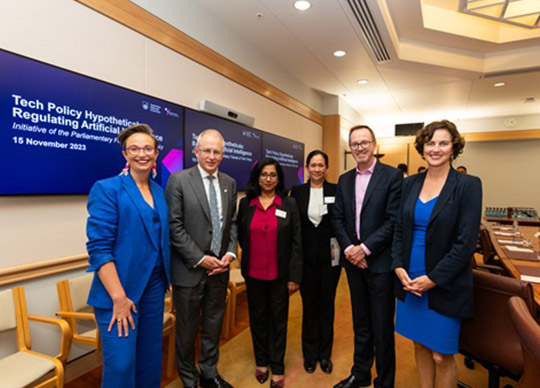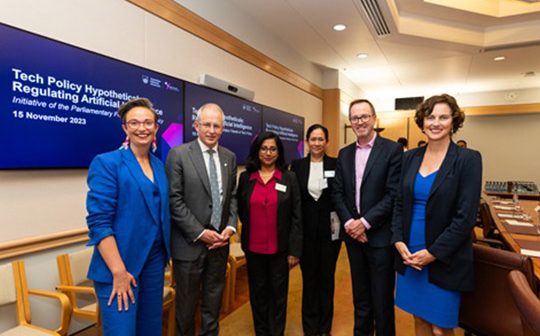
The Parliamentary Group of Friends of Tech Policy launched at Parliament House this week.
Co-chairs, the Hon. Paul Fletcher MP, Dr Michelle Ananda-Rajah MP, Kate Chaney MP, Senator David Pocock, Senator David Shoebridge and the ANU Tech Policy Design Centre, hosted the inaugural event – Tech Policy Hypotheticals: Regulating Artificial Intelligence.
The interactive event brought panellists and attendees together to engage with hypothetical scenarios to provoke conversation on how to regulate Artificial Intelligence (AI) with a view to maximising productivity.
Shadow Minister for Science, Arts, Government Services and the Digital Economy, the Hon. Paul Fletcher MP, said, “It is essential to mitigate the risks and explore the opportunities of Artificial Intelligence. The strong interest in this Group with representatives from all sides of politics reflects the importance of AI to Australia’s economic prosperity and the imperative of getting AI policy settings right.”
Dr Michelle Ananda-Rajah MP said, “With the rise of AI, the ANU Tech Policy Design Centre’s work providing an evidence base for better tech policy is timely. Parliamentarians must have access to independent expertise when considering the tech policy issues shaping our lives. The Parliamentary Friends of Tech Policy provides a forum to do just that, and I’m delighted to be one of its Co-Chairs.”
Kate Chaney MP said, “As Parliamentarians, we need to build a basic understanding of the rapidly changing field of AI, so we can regulate it appropriately to maximise the benefits and manage the significant potential risks.”
Senator David Pocock said, “Events like this are really important. Bringing experts together to engage with politicians is a great way to progress important conversations and policy discussions.”
Senator David Shoebridge said, “The launch of the Parliamentary Friends of Tech Policy gives us a glimpse of what Australia can contribute as an international leader in AI development and regulation. It is vital to ensure that AI moves forward with public accountability and that we guard against systemic inequality. To harness the many opportunities of AI, we must also proactively guard against the many risks.”
Founding Director of the Tech Policy Design Centre at the Australian National University, Professor Johanna Weaver, welcomed the launch of the Group, reflecting that it provides a vital forum for parliamentarians of all political persuasions to engage with subject matter experts and to think critically and creatively about the regulation of technology in Australia.
“The Parliamentary Friends of Tech Policy will help to reimagine governance as a powerful tool to shape technology for the long-term benefit of Australia and Australians. My team and I at the Tech Policy Design Centre look forward to working with the co-chairs and the members to usher in a new generation of fit-for-purpose tech regulation in our country.”
“With the proliferation of generative AI and strong capabilities of machine learning now at our fingertips, getting tech regulation right is top of everyone’s agenda. As the first meeting of the Group highlighted, it is possible to design regulation that protects against social harms and drives innovation – the two are not mutually exclusive, but we must be intentional today about the future we want to shape tomorrow.” Professor Weaver said.






